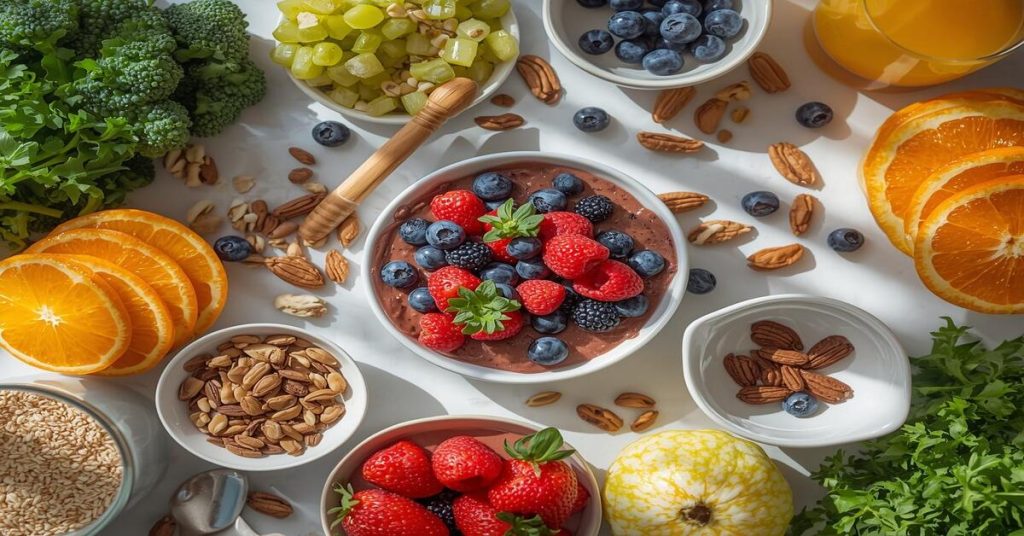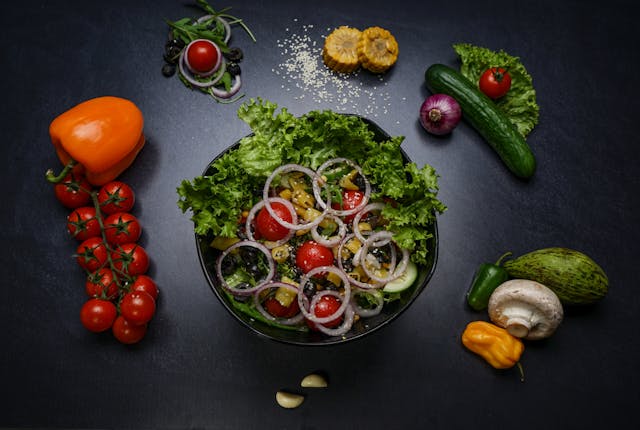Transform Your Life with Balanced Eating Habits 🍎🥗

In today’s fast-paced world, maintaining balanced eating habits is more than just a health trend — it’s a necessity for energy, mental clarity, and overall well-being. Many of us struggle with fatigue, bloating, weight gain, or poor focus, not realizing that the root cause might be our dietary choices. But here’s the good news: improving your eating habits doesn’t require perfection — just mindful progress. 🌟
Why Balanced Eating Habits Matter 💡
Balanced eating habits help your body function optimally. From maintaining stable blood sugar levels to supporting gut health and brain performance, your daily diet influences nearly every aspect of your life. When you consistently fuel your body with nutrient-rich foods, you’ll notice improved mood, better sleep, and lasting energy throughout the day.
Start with the Basics: What Does “Balanced” Really Mean? 🥦🍚
“Balanced” means including a variety of whole foods that nourish you in the right amounts. A good plate typically includes:
- 👩🌾 Lean Proteins (chicken, tofu, fish, lentils)
- 🥕 Complex Carbohydrates (brown rice, oats, quinoa)
- 🥑 Healthy Fats (avocados, nuts, olive oil)
- 🍇 Colorful Fruits & Vegetables (for fiber & antioxidants)
Balanced eating habits are not about restriction. Instead, they are about variety, moderation, and making informed choices.
Read more: How Nutrient-Dense Meals Can Naturally Boost Your Energy
10 Proven Ways to Build Balanced Eating Habits 🍏
1. Start with a Balanced Plate
Include protein, carbs, healthy fats, and vegetables in every meal to create a foundation for balanced eating habits.
2. Eat Mindfully and Slowly
Focus on your food, chew thoroughly, and avoid distractions to prevent overeating.
3. Stay Hydrated Throughout the Day
Drinking enough water is key to digestion and reduces unnecessary snacking.
4. Avoid Processed and Sugary Foods
Limit foods with added sugars and chemicals that disturb your body’s natural balance.
5. Plan and Prep Your Meals in Advance
Meal prepping helps you avoid unhealthy decisions when you’re in a rush or tired.
6. Understand Food Labels
Learn how to read ingredient lists and nutrition facts to make smarter choices.
7. Choose Whole and Natural Foods
Go for foods that are fresh, colorful, and minimally processed for real nourishment.
8. Adjust Your Diet Based on Age and Lifestyle
Balanced eating habits change depending on your life stage and activity level.
9. Embrace Cultural and Traditional Foods
Include healthy versions of meals from your heritage to stay connected and healthy.
10. Be Consistent, Not Perfect
Balanced eating is about long-term habits, not short-term diets or restrictions.
Top Benefits of Balanced Eating Habits 🌞
- ⚡ Increased energy levels
- 🧠 Enhanced focus and brain clarity
- 💤 Improved sleep quality
- ⚖️ Healthy weight maintenance
- 🛡️ Stronger immune system
Common Mistakes to Avoid ❌
Even with the best intentions, many people fall into traps that sabotage their healthy goals. Let’s break down a few:
- Skipping meals or intermittent starving
- Overloading on “low-fat” or “diet” foods loaded with sugar
- Eating out too often without portion control
- Drinking sugary beverages instead of water
Balanced eating habits can’t be built on shortcuts or extremes. They need consistent awareness and small, meaningful changes.
Read more: Chrononutrition for Energy: 20 Proven Meal-Timing Strategies
Smart Tips to Build Healthy Eating Habits 🛠️
- 🍽️ Eat slowly and mindfully. Pay attention to hunger and fullness cues.
- 🥤 Stay hydrated. Aim for 8–10 glasses of water daily.
- 📆 Plan meals and snacks ahead of time to avoid junk cravings.
- 🛒 Grocery shop with a healthy list — and stick to it!
- 🏡 Cook more meals at home. You control the ingredients and portion sizes.
How Balanced Eating Habits Boost Your Mental Health 🧘♂️
What you eat directly affects how you feel. Foods rich in omega-3s, B vitamins, and antioxidants reduce inflammation and help regulate mood. Balanced meals support the production of neurotransmitters like serotonin, often referred to as the “happy hormone.”
When you nourish your body, your mind feels more stable, calm, and focused — and that’s a game-changer in today’s stressful world.
Sample One-Day Balanced Eating Plan 📅
- Breakfast: Oatmeal with bananas, chia seeds, and almonds 🥣
- Snack: Greek yogurt with berries 🍓
- Lunch: Grilled chicken, quinoa, and steamed broccoli 🍗🥦
- Snack: Carrot sticks with hummus 🥕
- Dinner: Baked salmon, brown rice, and sautéed spinach 🐟
Balanced Eating Habits for Busy People ⏱️
No time? No excuse! Here are ways to maintain balance on a busy schedule:
- 🌯 Prepare meals in bulk (meal prep)
- 🥬 Keep frozen veggies & canned beans for quick use
- 🍱 Use portion-controlled containers
- 📦 Keep healthy snacks in your bag or desk
Eating Mindfully: A Forgotten Key 🧘♀️
Balanced eating habits go beyond what’s on your plate. It’s also about your relationship with food. Slow down. Appreciate the taste, texture, and aroma of what you eat. Turn off distractions while eating — it makes a bigger difference than you might think!
Read more: 15 Healthy Eating Habits for Better Energy and Wellness
Is Cheat Day Okay? 🤔
Yes — one indulgent meal won’t ruin your progress. In fact, allowing yourself occasional treats helps you stay motivated and avoid feelings of guilt. Just return to your balanced routine afterward.
Best Natural Supplements to Support Balanced Eating 🧴
If your diet lacks certain nutrients, the following supplements can support your goals (consult a doctor first):
- 💊 Omega-3 (from fish oil)
- 💊 Vitamin D (especially in winter)
- 💊 Probiotics for gut health
- 💊 Magnesium (for sleep and stress)
Balanced Eating Habits for Different Age Groups 👶👵
Balanced eating habits are essential at every stage of life — but what you need changes with age. Children require nutrient-dense foods for growth, while adults need balanced meals to sustain energy and prevent disease. Seniors, on the other hand, need more calcium, fiber, and hydration to maintain vitality and strength.
For Children:
- 🥛 Encourage dairy or calcium-rich alternatives for strong bones
- 🥕 Introduce a variety of colorful vegetables early
- 🍳 Include iron-rich foods for brain development
For Adults:
- 🍗 Lean proteins help maintain muscle mass
- 🥬 Focus on fiber-rich carbs to support digestion
- 🥑 Choose healthy fats for heart health
For Seniors:
- 💧 Drink plenty of fluids to avoid dehydration
- 🫘 Incorporate beans, whole grains, and fruits to support gut health
- 🧀 Ensure adequate calcium and Vitamin D intake for bones
Recognizing these different needs ensures your balanced eating habits grow with you, making them sustainable and effective for a lifetime.
Understanding Food Labels for Smarter Choices 🔍
If you’re serious about balanced eating habits, learning how to read food labels is non-negotiable. Manufacturers often use clever marketing to disguise unhealthy ingredients. But when you look at the actual nutrition facts and ingredients list, the truth is revealed.
Look out for:
- 👀 Hidden sugars (like high-fructose corn syrup, maltose, or cane syrup)
- 🧂 Sodium content — keep it under control for heart health
- 🌽 Unnecessary additives, food dyes, or preservatives
Always aim for whole, minimally processed foods that list recognizable ingredients. The fewer, the better!
Read more: 15 Healthy Eating Habits to Boost Energy & Wellness 🌿
How Culture Shapes Balanced Eating Habits 🌍
Balanced eating is not about Western rules. Every culture offers healthy, whole food traditions that support balance. From the Mediterranean diet rich in olive oil and fish, to Asian plates with rice, vegetables, and fermented foods — your heritage can be your health ally.
Explore traditional meals in your culture and look for ways to modernize them without losing authenticity. Adding balance doesn’t mean losing identity — it’s about enhancing the value of what you already have.
Balanced Eating Habits on a Budget 💰
There’s a myth that healthy food is always expensive. While some superfoods carry a high price tag, most balanced eating habits can be maintained affordably with smart planning.
Here’s how:
- 🥦 Buy seasonal produce — it’s cheaper and fresher
- 🛍️ Shop in bulk for dry items like lentils, oats, and brown rice
- 🍳 Cook large meals and freeze leftovers to reduce waste
- 🏷️ Use store brands and coupons
Remember, investing in good food today can save you thousands in future healthcare costs. That’s a trade worth making!
The Role of Gut Health in Balanced Eating 🦠
Your gut — often called the “second brain” — plays a critical role in digestion, immunity, and even mood. A balanced diet helps feed the good bacteria in your gut, creating a healthy microbiome that supports your overall wellness.
Include these gut-friendly options:
- 🧄 Prebiotics: garlic, onions, bananas
- 🧉 Probiotics: yogurt, kefir, kimchi, sauerkraut
- 🥣 Fiber: whole grains, legumes, fruits
Balanced eating habits aren’t only about your waistline — they’re about feeding your inner ecosystem for long-term health.
Dealing with Cravings the Smart Way 🍫
Cravings are natural — and they don’t mean you’re weak. The key is learning how to manage them without spiraling into unhealthy patterns.
Tips to manage cravings:
- 🥤 Drink water first — dehydration often mimics hunger
- 🍇 Replace candy with naturally sweet fruits
- 🕒 Eat small, regular meals to avoid energy crashes
- 💭 Pause and ask: “Am I bored, emotional, or truly hungry?”
Over time, as your balanced eating habits become stronger, your cravings will naturally reduce — and when they happen, you’ll have healthier tools to handle them.
Staying Consistent with Balanced Eating Habits 📈
Building habits is one thing — sticking to them is another. Consistency is what transforms healthy choices into a lifestyle.
How to stay consistent:
- 📓 Track your meals and progress in a journal or app
- 🧘 Focus on progress, not perfection — celebrate small wins
- 👨👩👧👦 Surround yourself with people who support your goals
- 📅 Set reminders or meal-prep days in your weekly calendar
Balanced eating habits are not a temporary fix — they are a long-term commitment to yourself. Show up, again and again, and your body will thank you for decades to come. 🌻
Final Thoughts 🌟

Real transformation doesn’t come from trendy diets or short bursts of motivation — it comes from building balanced eating habits that stick. The food choices you make every day are silent investments into your future self. Whether it’s a handful of almonds instead of chips, or a colorful salad instead of fast food, each small decision compounds over time into vibrant health and mental clarity. 🌈
Balanced eating isn’t about following strict rules. It’s about knowing yourself. What foods energize you? What patterns make you feel sluggish? When you start listening to your body and responding with compassion instead of judgment, the journey becomes a lot easier and more enjoyable. 💚
And remember: nutrition is not one-size-fits-all. What works for someone else may not be perfect for you — and that’s okay. You are allowed to evolve, to experiment, and to find what balance looks like for your unique life, culture, schedule, and needs.
If you ever fall off track, don’t quit. There’s no finish line in healthy living. Every day offers a new chance to choose well, eat mindfully, and nourish your body like it deserves. 💪
So next time you’re preparing a meal or walking through the grocery store, pause and ask: “What would serve my body best today?” That one question — asked repeatedly with care — can completely shift your eating habits and the way you feel in your skin. ✨
Learn more about healthy eating habits on Harvard’s Nutrition Source.
Check this USDA MyPlate guide for balanced nutrition advice.
You’re not just eating food — you’re shaping your future.


